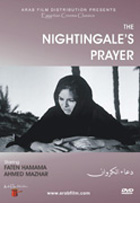
The Nightingale's Prayer 2004; original production 1959
Distributed by Arab Film Distribution, 10035 35th Ave. NE, Seattle, WA 98125; 206-322-0882
Producer n/a
Directed by Henri Barakat
DVD, b&, 126 min.
Sr. High - Adult
Film Studies, Middle Eastern Studies, Women's Studies
Date Entered: 05/05/2004
Reviewed by Jane Sloan, Rutgers University LibrariesThe Nightingale's Prayer is a compelling melodrama, an important example of Egyptian cinema at the height of its popularity not only in Egypt, but also in nearby Arab countries. The story is of two young women and their mother who are banished from their idyllic, isolated village by an uncle who is shamed by his brother's adulterous behavior. In the city, they are dispersed to various houses as servants, and one of the sisters is seduced by her bachelor employer. Fleeing to the "safe haven" offered by their uncle, they instead witness him murder the girl. Anma, left alone with her mother, blames her for trusting the uncle, and flees back to the city on her own. There, she vows revenge on the bachelor and maneuvers to work in his house. Unable to follow through with her plan to poison him, she instead seeks to torture him by making him fall in love with her, managing at the same time to instill in him a new compassion for others. This particular course of events is handled at length and with great subtlety and respect for the characters' intelligence. Even as their love for one another becomes clear, Anma cannot forget the injustice done her sister and her master's part in it – "Uncle killed her, the victim, and let you go free!"
Dialog and events address issues such as the Europeanization of the middle class via colonialization, the harsher codes of the countryside compared to the city, and the moral responsibility of individuals who take advantage of their position in society. Along side the fascinating lead actress, the script sketches many interesting characters who are distinct types, and who function in surprising ways. Fine acting and a sophisticated flashback narrative make the story consistently compelling.
It is variously known as The Curlew's Cry/Cry of the Plover/Du'a' al-Karawan/Doa al Karawan. The digital restoration is good and the DVD includes access to 24 sections within the film, English and French subtitles, press materials, and a very interesting "restoration demo" that shows the gains in stability and definition of the enhanced version. Highly recommended for public or academic libraries with an interest in world cinema, as there are so few examples of this significant regional cinema available, as well as Muslim culture, and the condition of women in the world.